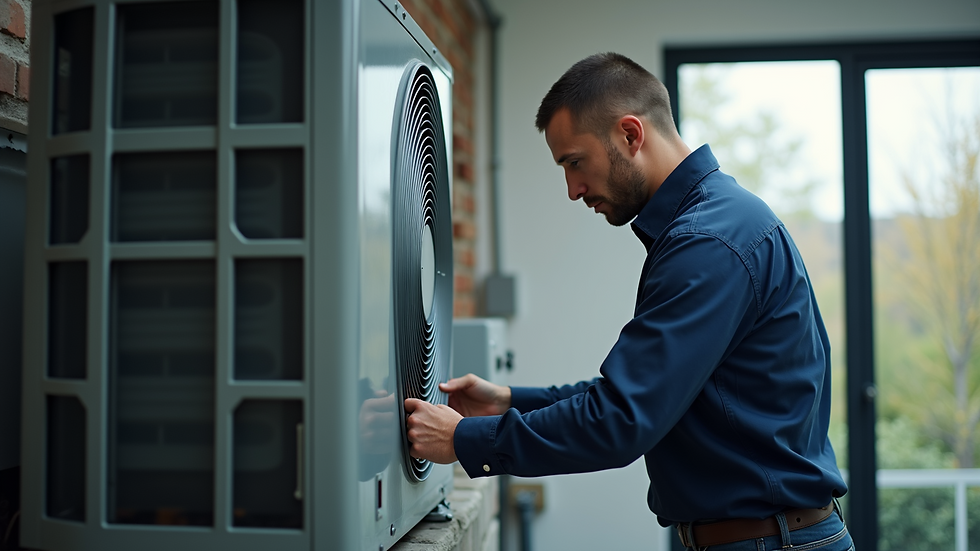How to Handle an AC Breakdown During the Hottest Days
- rm0225546
- Jun 20
- 4 min read
When the temperature climbs to unbearable heights, your air conditioning (AC) system plays a crucial role in keeping your home cool and comfortable. But what happens when your AC breaks down during a scorching heatwave? Panic can set in, but with a few practical strategies, you can effectively navigate this challenging situation. In this blog post, we'll outline how to handle an AC breakdown during the hottest days, ensuring you stay cool and collected until the problem is resolved.
Understanding AC Breakdown
An AC breakdown can occur for various reasons, such as a faulty compressor, frozen evaporator coils, or electrical issues. According to the U.S. Department of Energy, about 90% of homeowners experience some type of AC failure in their lifetime. That’s a significant number, especially during the peak summer months when almost 87% of American homes rely on air conditioning.
When your AC breaks down, the first step is understanding the symptoms. If you notice warm air blowing through your vents, strange noises, or unusual odors emanating from your unit, it's time to investigate further.

Preparing for an AC Breakdown
Preparation is key to handling an AC breakdown smoothly. Before the hot days arrive, consider the following steps to ensure you’re ready:
Regular Maintenance: Schedule annual maintenance for your AC system. Technicians can identify and fix potential issues before they escalate into expensive repairs.
Keep Spare Coolants Handy: Depending on your HVAC system, it may require specific coolant levels. Having some on hand can be useful for emergencies.
Know Your Warranty: Familiarize yourself with the terms of your AC warranty. This knowledge can expedite repairs and potentially save on costs if the breakdown occurs.
Install a Backup System: If you live in an area prone to heatwaves, consider investing in a portable air conditioning unit or fans. These can help maintain comfort until your main system is back up and running.

What to Do When Your AC Breaks Down
When the inevitable happens and your AC breaks down, follow these steps to mitigate the discomfort:
Stay Calm and Assess the Situation
Initially, take a deep breath. Recognizing what went wrong is crucial. Check the thermostat settings and ensure it is set to cooling mode. Sometimes, the issue may be as simple as a blown fuse or a tripped circuit breaker.
Contact a Professional
If basic troubleshooting doesn’t resolve the issue, it's time to contact a professional HVAC technician. Look for reputable services that specialize in emergency air conditioning repair. Professionals can quickly diagnose problems, ensuring you get back to comfort sooner.

Provide Temporary Relief
While waiting for professional help, consider these ways to keep cool:
Close Blinds and Curtains: Block out direct sunlight to reduce indoor temperatures.
Use Fans Wisely: Ceiling fans and portable fans can create air circulation. Set them to rotate counterclockwise to push cool air down.
Seal Off Unused Rooms: Close doors to rooms that you do not use often. This helps to concentrate cool air in the most used areas of your home.
Coping Strategies for Extreme Heat
While waiting for a technician, it’s essential to think about coping mechanisms during extreme heat. Here are some strategies:
Stay Hydrated: Drink plenty of water. Hydration is crucial, especially during heatwaves, to prevent heat exhaustion and heat strokes.
Wear Lightweight Clothing: Choose breathable fabrics like cotton or linen. They are perfect for keeping your body temperature down.
Cool Showers: If possible, take cool showers or baths. It’s a refreshing way to lower your body temperature when your AC is out of commission.
Limit Electrical Use: Minimize the use of heat-generating appliances like ovens, stoves, and dryers. This helps keep indoor heat to a minimum.
When to Consider Replacement
Sometimes, a breakdown could indicate that your AC unit is nearing the end of its lifespan. If you find yourself facing repeated repairs, it may be time to contemplate a replacement. Here are a few signs that suggest replacement might be necessary:
Age of the Unit: Most air conditioning units last between 10-15 years. If yours is older, upgrading may be more economical.
Rising Energy Bills: If you notice a steep increase in energy costs, your system might be running inefficiently.
Frequent Breakdowns: Repeat repairs can pile up costs. The more often your AC breaks down, the more sense it makes to invest in a new, more reliable system.
Final Tips for Staying Cool During an AC Breakdown
A breakdown during a heatwave can be overwhelming, but following these final tips can help:
Stay Informed: Monitor local weather forecasts. If heat advisories are issued, take extra precautions.
Have a Backup Plan: Know your closest places to cool off, whether it's a friend’s house or a public cooling center.
Evaluate Installation Options: Once you're ready to replace your unit, research energy-efficient options. A better system leads to significant savings in the long run.
By taking these steps, you can dramatically improve your experience during an AC breakdown in the hottest days of summer. Being prepared and knowing how to react can mean the difference between misery and manageable comfort. Remember, your home should be your refuge from the heat, so take proactive measures to ensure it remains that way.






Comments